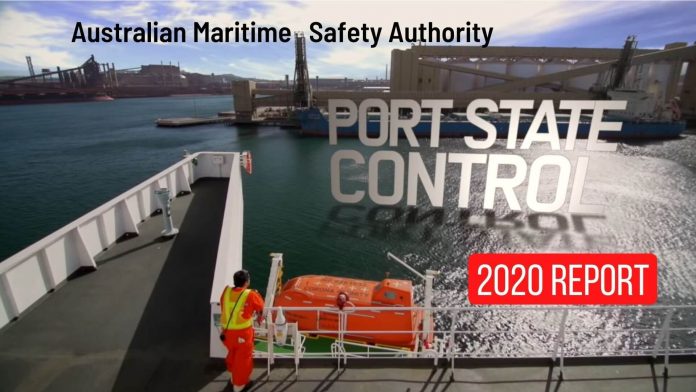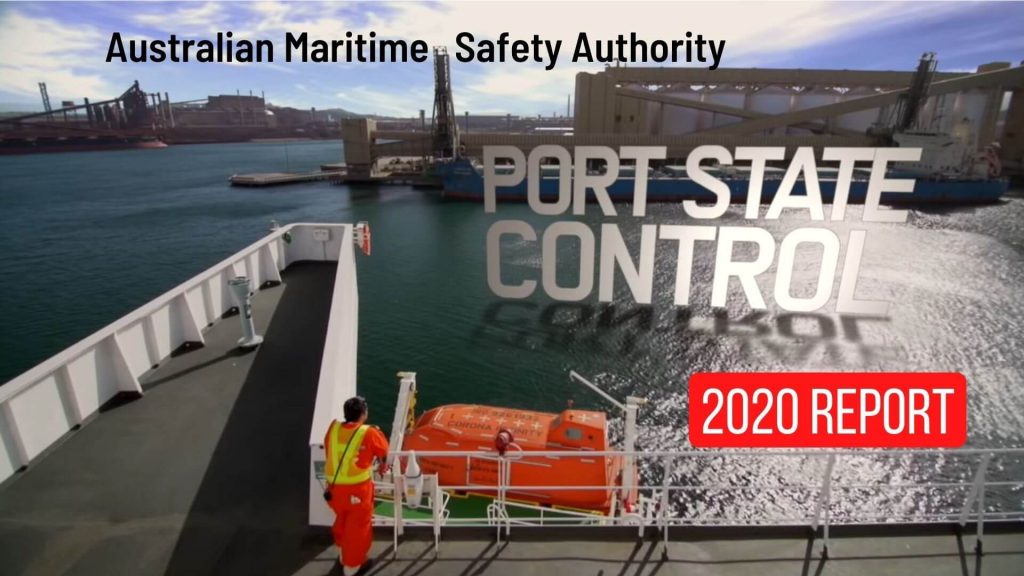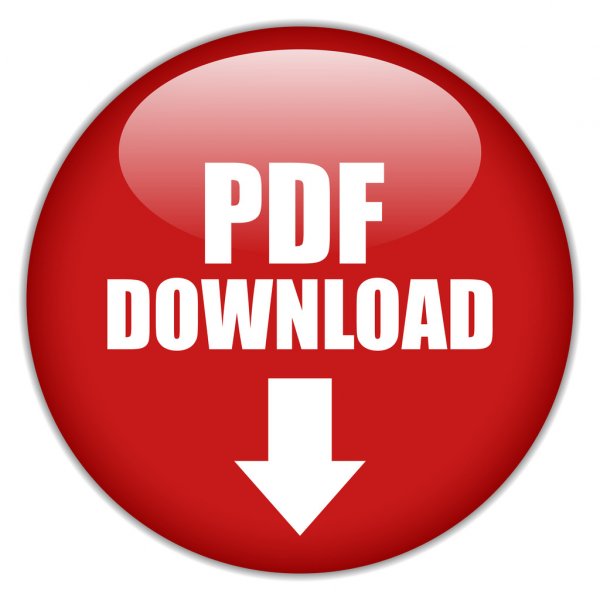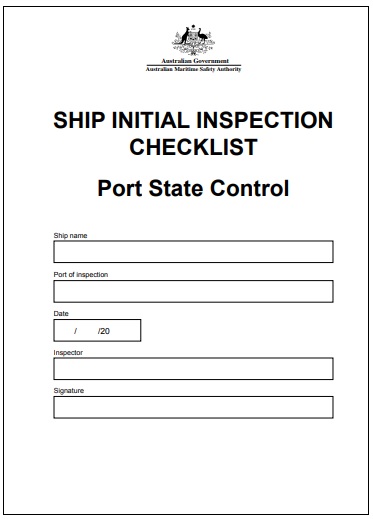
(www.MaritimeCyprus.com) This report summarises the PSC activities of the Australian Maritime Safety Authority (AMSA) and reports on the performance of commercial shipping companies, flag States and Classification Societies for the 2020 calendar year.
AMSA Inspectors undertook 3021 PSC inspections during 2020. While this is a reduction of 6.2 per cent from 2019, it is only a slight reduction of 201 inspections over the full year, or around 4 per week around the entire country. When compared against the number of arrivals, this outcome is a positive achievement as the 6.2 per cent drop-in inspections occurred in a period where the total port arrivals decreased by 8.4 per cent, or 2405 less arrivals.
The PSC inspection results for 2020 saw a slight increase in the detention rate of ships from 5.1 per cent in 2019 to 5.9 per cent (The peak in 2011 was 9.2 per cent).
The average deficiency rate also increased from 1.6 deficiencies per inspection in 2019 to 2.1 deficiencies per inspection in 2020. While an increase was observed, the deficiency rate has only been less than 2.1 twice in the last 10 years.
As noted in previous reports, from 2013 onwards, ships and operators with a record of poor performance can be refused access from entering or using Australian ports through a direction issued under section 246 of the Navigation Act 20121. In 2020, AMSA refused access to five ships for periods ranging from 3 to 12 months. Four of these directions were issued in response to significant breaches of the Maritime Labour Convention, 2006 (MLC).
The annual PSC report previously contained a section dedicated to MLC. The information is now contained in a separate dedicated MLC report available on the AMSA website co-located with this report.
This report retains the basic MLC PSC statistics contained in previous reports for the purpose of comparison between deficiency and detention categories.

2020 summary of PSC activity
- During the calendar year there were:
- 26,179 ship arrivals by 6081 foreign-flagged ships
- 3021 PSC inspections
- 178 ship detentions.
- Bulk carriers accounted for 54.8 per cent of ship arrivals and 60.9 per cent of PSC inspections.
- PSC inspections were carried out at 46 Australian ports.
- The average gross tonnage per visit was 54,318 GT compared to 52,775 GT in 2019.
- The average age of ships in 2020 was 11 years, compared to 10 years old in both 2019 and 2018.
Key points
- In 2020, the number of foreign-flagged ship arrivals decreased by 2405 (8.4 per cent) to 26,179. The number of arrivals by individual ships increased by 100 to 6081 (up 1.7 per cent).
- The number of initial PSC inspections conducted during 2020 decreased by 201 (6.2 per cent) to 3021.
- The overall number of deficiencies increased to 6387 in 2020, compared to 5281 in 2019.
- The average number of deficiencies per inspection increased to 2.1 in 2020, compared to 1.6 in 2019.
- The number of detainable deficiencies increased to 270 in 2020, compared to 218 in 2019. The largest contributor to this was ISM detainable deficiencies increasing to 76 in 2020, compared to 52 in 2019.
- The number of detained ships increased to 178 in 2020, compared to 163 in 2019. The detention per inspection rate also increased to 5.9 per cent in 2020, compared to 5.1 per cent in 2019.
Trends for 2020
As observed in past PSC annual reports, the most frequent cause of detention since 2010 relates to ineffective implementation of the safety management system (SMS) as required by the International Safety Management (ISM) Code. In 2020 the number of ISM detainable deficiencies increased to 76 (occurring in 2.5% of PSC inspections) compared to 52 in 2019 (occurring in 1.6% of PSC inspections). The rate of structural and equipment deficiencies per inspection increased to 1.1 in 2020 from 0.9 in 2019. This highlights an increase in maintenance issues that are not being addressed by the ships SMS as implemented onboard. This is likely to be related to a combination of factors including:
- An increase in the average age of ships visiting Australia, which increased from 10 years in 2019, to 11 years in 2020.
- Difficulties, as reported by operators, with conducting shore-based maintenance due to COVID-19 restrictions. Operators also reported difficulty in superintendents being able to visit their ships due to COVID-19 restrictions, which affected their ability to conduct on-board audits of the SMS.
- A decrease in investment by Operators to effectively maintain ships due to an economic downturn in industry during the COVID-19 pandemic.
Fire safety (13.7 per cent), life-saving appliances (13.7 per cent) and emergency systems (13.0 per cent) again appeared in the top five categories of detainable deficiencies. These three categories have been in the top five since 2014.
Pollution prevention related detainable deficiencies dropped out of the top five categories for detention, despite the introduction of the sulphur cap which came into effect through MARPOL ANNEX VI on 1 January 2020. To assist industry ahead of the introduction of the sulphur cap, AMSA issued two marine notices in 2019, MN2019/04 (Implementation of the 1 January 2020 low sulphur fuel requirement) and MN2019/05 (Requirements for the use of Exhaust Gas Cleaning Systems in Australian Waters and reporting to AMSA) outlining AMSA’s expectations and approach to compliance in this space.
Watertight and weathertight deficiencies moved into the top five detainable deficiencies (8.1 percent) coinciding with the increase in SMS maintenance issues mentioned above.
2018 | 2019 | 2020 |
| ISM – 21.1% | ISM – 23.9% | ISM – 28.1% |
| Fire safety – 16.8% | Fire safety – 17.4% | Fire safety – 13.7% |
| Emergency systems – 12.5% | Emergency systems – 16.5% | Lifesaving appliances – 13.7% |
| Pollution Prevention – 12% | Lifesaving appliances – 14.7% | Emergency systems – 13.0% |
| Lifesaving appliances – 11.2% | Pollution Prevention – 11.5% | Water/Weather-tight – 8.1% |
For even more details, click below to download full report:
To help your crew prepare for an upcoming PSC inspection in Australia, download below the relevant AMSA PSC checklist:
Source: Australian Maritime Safety Authority (AMSA)
















